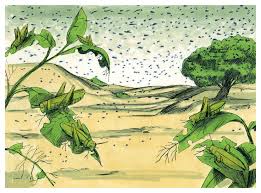
to blow in great swarms of locusts.
I always look forward to the plagues. That part of the Haggadah recited in a singsong ritualistic manner is accompanied by the small thrill of putting my finger into the wine cup and marking my plate. It carries with it a memory that despite the power and might and Technicolor special effects accompanying our redemption, we need to be mindful that the Egyptians suffered. In the exquisite theatre of the Seder, every participant has an active role in this custom. To make out seders lively and fun for the children, we often decorate our table with frogs and beasts and lice- a real table top menagerie.
Yet despite the few drops of wine what do the plagues have to teach us? Consider the first plague- “blood”. The Torah reads: “ God said to Moses,” Tell Aaron to take his staff and extend his hand over the waters of Egypt- over their rivers, their canals, their reservoirs, and every place where water is kept- and the water shall turn into blood. There will be blood throughout all Egypt, even in wooden barrels and stone jars. Moses and Aaron did exactly as God had instructed and Aaron held the staff up and then struck the Nile’s water in the presence of Pharaoh and his officials. The Nile’s water was transformed into blood. The fish in the Nile died and the river became so polluted that the Egyptians were no longer able to drink the Nile’s water. There was blood everywhere in Egypt….The Egyptians dug around the Nile for drinking water, since they could not drink any water from the river. After God struck the Nile, it remained that way for seven full days (Ex 7:19-231). They could have certainly applied for extra aid and qualified as a national disaster. It must have been horrific. People and wild life must have died. How could Pharaoh have been so stubborn and entrenched in his way of thinking? How could he have ignored this beginning of such a great wave of suffering? Now the answer regarding Pharaoh is found in Exodus 9:12-“It was God who made Pharaoh obstinate”.
There are many explanations and interpretations concerning the plagues. A midrash suggests that the Egyptians were punished measure for measure for the cruelty and indifference to the suffering of their Israelite slaves. Rav Kook explained that God brought the plagues upon the Egyptians in order that they should understand the essence of God’s presence in the world. His influence over everything. His intimate relationship with His world and His ability to do anything.”
Another modern scholar explains the plagues as emblematic of our greatest fears. Shai Zarhi, an Israeli Educator writes: “The plagues Gode visited on the Egyptians in Egypt seem to be a parade of people’s greatest fears. They are a mythological show of the power of the living vs. primal fear. Starting from the blood of birth and of death, through primal human fears of small creatures(lice) and large ones (wild beasts), fear of financial ruin(locusts), fear of the dark (losing direction and meaning) we face the greatest fear, the fear for our children’s lives- loss of the future. Tonight, a night to commemorate the past, we see the mercy of God’s protections, look out from our places at a world full of fears and dangers and pray for another quiet year.”
The term used to describe Pharaoh’s indifference in the face of these disasters is “Kaved Lev “which is translated as meaning obstinate, stubbornly refusing to change his opinion or course of action despite the attempts to persuade him to do so. We are told in the Torah that God made Pharaoh obstinate so that this redemption would be spectacular with an abundance of special effects and everyone involved would know that it was God himself who orchestrated this redemption.
In the time of the Egyptians, many of the plagues were reversible. The bloody Nile was returned to clear potable water, the boils disappeared and the frogs went away. We are not so lucky with our manmade plagues. When we pollute the waterways or impact on our climate or waste precious resources simply because of greed and/or indifference, we cannot always reverse the consequences of our actions and the consequences might endanger our most precious commodity, that being our future.
This year when I dip my finger into my wine cup as we recite the names of the Biblical plagues, I will remember that these plagues did have grave consequences on the Egyptians, but I will also see each stain on my plate as a promise of action to protect the next generations. Unlike Pharaoh I can’t blame God, this time it is in our hands.
This is the second in the series Four Women’s Collected Essays on the Meaning of Passover. For introduction to our series Click here.